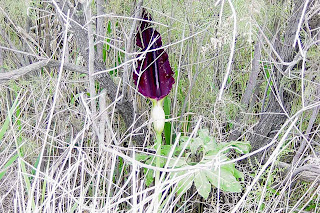(Voodoo Lily)
For years I have tried to get my readers to be as enthusiastic about the island as I am: I have written about its hidden treasures, about its overwhelming natural beauty, its food and its inhabitants and I have published Scatterlight Donkeys & Foxballs Ice Cream, a book with columns and photographs. What is the result of all that writing? The island remains empty this summer. Who is afraid of Lesvos?
Lesvos can be a bit scary, I admit. There are volcanoes which have been sleeping for over a million years, possibly waiting to wake up, the only traces of their last eruption being the petrified trees. In the sea there are floating stones, sea urchins, barracudas and sharks (which you may also find on your dinner plate). On that same plate there might appear weeds: chorta-la-dee-dee or wild vegetables.
Close to the capital, the graves of vampires have been found and who knows, they still may be around. In the shrubbery of the chestnut forest near Agiasos, there lurk thousands of dragons, or drakondia, the Greek name for aroids (flowers). A bigger species is the Dracunculus vulgaris, also called Dragon Arum, Voodoo Lily or Snake Lily. This little giant can grow as tall as one meter and has a huge pink to blood red spathe that curls around an enormous spadix. An excellent flower for a horror movie. It is the smaller version of the biggest flower in the world, the Titan Arum or Amorphophallus titanum, whose latin name refers to the huge phallus-like spadix that can reach a height of three meters. Just like his little sister this flower smells like hell, so you better not run into it. The Titan Arum can only be found on Sumatra, the Voodoo Lily however can be encountered everywhere on Lesvos.
Many woods of Lesvos are a bit creepy. You may bump into the poisonous yellow rhodondendron that can kill entire armies, you may run into hidden little chapels, where you can pray to be found if you are lost. You risk falling into waterfalls and there are caves you only can reach at risk to your life. The roads are amongst the most dangerous of the world because the other road users are roaming donkeys, flocks of sheep, sweet hedgehogs or gossiping Greeks and birdwatchers staring through camera’s as big as stargazers; and the romantic ponds along the roads are full of turtles that beg for bread.
There are rude foxes who steal telephones, crickets whose screaming can damage your hearing and complete armies of ants that can occupy your bed. Daily there will be sunshine that can damage your skin, colouring it red or petrify it.
Most hotels on the island do not offer ‘all inclusive’, so you have to find food for yourself. Most restaurants only have Greek food and fish is served whole, and if they are small enough you are supposed to eat them with head and tails. There are no fortune cookies here, but while eating, its entirely possible that birds with forked tails will fly straight over your head: Greeks see swallows as good luck birds. Gigantic wasps may be fed with meat, in order to keep them from your table, or the owner of the restaurant may take out his old rifle in order to chase them with an ear deafening boom.
This is the Greek island that you have to avoid, because last year it was ‘unsafe‘ because of refugees. Be aware: last weekend the roads again were unsafe, this time because of masses of pilgrims who, just like the refugees last year, were walking the roads, only now in the opposite direction, towards Mandamados where the Taxiarchis Monastery had its yearly party.
I nearly got out of the car and joined the walkers, because the island urgently needs help. Archangel Michael, whose name day was the cause for the pilgrimage, is also the patron saint of the island. He is a fighter and more than once he has intervened on earth. Last year he sent armies of brave angels to the island. Now that nearly no refugees arrive and the island has been cleaned, suddenly there are no longer any vacationers — doubling the crisis on the island. Would Michael please send some tourists?
Anyway, after writing 500 columns, I will continue reporting from this forbidden paradise, the hidden pearl of the Aegean. Because apparently people still are afraid of Lesvos!











